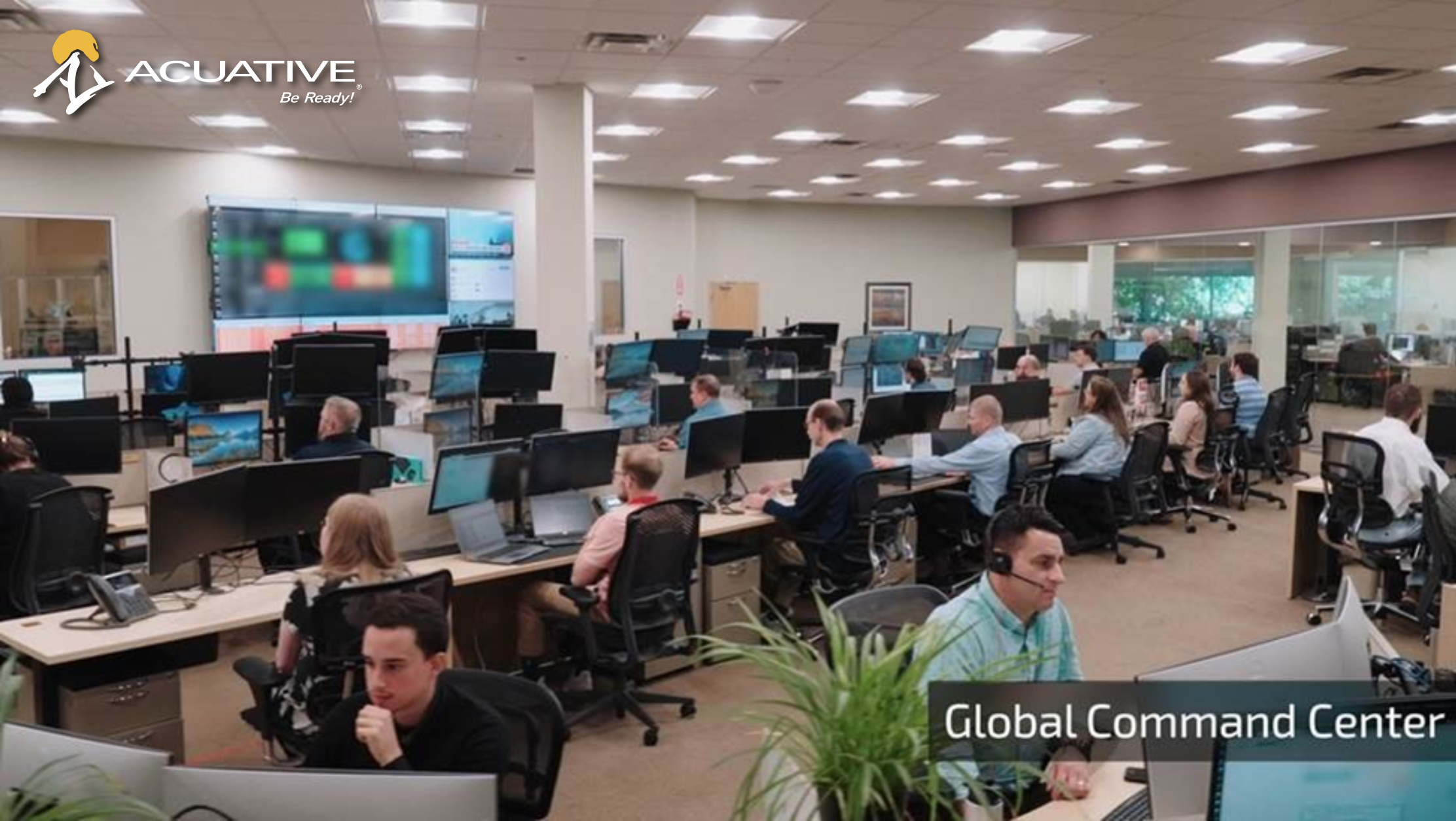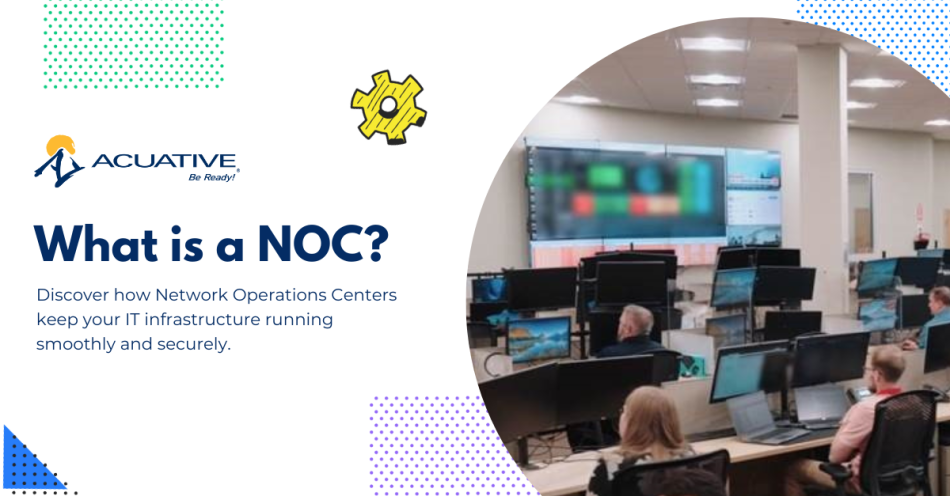Network Operations Centers, commonly referred to as NOCs, play a crucial role in ensuring the smooth operation of networks and systems. But what occurs at the NOC? What are the day-to-day responsibilities for NOC employees?
If you've ever wondered about the functions of a NOC, why it's important, what the employees are like, and why customers should choose a particular NOC, you've come to the right place. This blog will guide you through all these aspects of a Network Operations Center.
Contents:
- What is a Network Operations Center (NOC)?
- Why is a NOC Important?
- In-House vs. External NOC: Key Considerations
- What Makes a Good NOC Employee?
- Frequently Asked Questions
- Why Choose Acuative's NOC?

What is a Network Operations Center (NOC)?
A Network Operations Center (NOC) is a centralized location where IT professionals monitor, manage, and maintain the performance and security of computer networks, systems, and services. NOCs are equipped with advanced monitoring tools, real-time analytics, and highly trained staff to ensure the continuous operation of a company's network infrastructure.
Why is a NOC Important?
- Proactive Monitoring and Issue Resolution
NOCs provide real-time monitoring of network and system performance. They can detect potential issues before they escalate into major problems, allowing for proactive resolution. This minimizes downtime and disruptions, ensuring that businesses can operate smoothly. - Enhanced Security
NOCs also play a significant role in network security. They can identify and respond to security breaches, vulnerabilities, and suspicious activities promptly. By actively protecting the network, NOCs safeguard sensitive data and maintain the integrity of the organization. - Scalability and Growth
As a business grows, its network infrastructure needs to evolve. NOCs help organizations scale their networks, add new components, and optimize performance as required. This adaptability is vital in today's rapidly changing technology landscape. - Cost-Efficiency
By monitoring and resolving issues efficiently, NOCs can reduce the total cost of ownership for network infrastructure. Downtime, emergency fixes, and unplanned maintenance can be costly, and these support centers helps minimize these expenses.
In-House vs. External NOC: Key Considerations
Choosing between an in-house NOC and an external NOC via an MSP comes down to factors like cost, expertise, scalability, and operational efficiency. While an in-house NOC offers direct control, an external NOC provides access to specialized support without the heavy investment in personnel and infrastructure. Here’s how they compare:
Cost Efficiency: Running an in-house NOC requires significant investment in staffing, training, and infrastructure, while an external NOC provides 24/7 coverage at a predictable, often lower cost.
Expertise & Resources: An in-house team has deep familiarity with internal systems, but maintaining up-to-date expertise requires ongoing training and hiring. An MSP’s NOC provides access to experienced engineers with a broad skill set across multiple technologies.
Scalability & Flexibility: Expanding an in-house NOC means hiring more staff and upgrading infrastructure, which takes time and budget. An external NOC can quickly scale up or down based on business needs without major capital investments.
Control & Customization: An in-house NOC allows for direct oversight and fully customized processes. External NOCs may require initial adjustments to align with business needs, but reputable MSPs offer flexible service models and detailed reporting for transparency.
Response Time & Coverage: While an internal team is physically close to the infrastructure, maintaining 24/7 coverage can be resource-intensive. MSPs provide around-the-clock monitoring and proactive issue resolution, often using automation and AI to detect and address problems before they cause downtime.
For businesses that require full control and have the resources to support it, an in-house NOC may be the right choice. However, for organizations looking for cost-effective, scalable, and expert-driven network management, an external NOC via an MSP offers a strategic advantage.
What Makes a Good NOC Employee?
NOCs are staffed by highly trained and skilled professionals who possess a deep understanding of network architecture, hardware, software, and security protocols. Common traits include technical proficiency, analytical skills, attention to detail, problem solving, teamwork, and a customer first mindset. Some common roles include:
Network Technicians: They monitor and troubleshoot network and system issues, responding to alerts and incidents in real-time.
Network Engineers: These professionals design and implement network solutions, ensuring optimal performance and reliability.
Information Security Managers: Focused on network security, they work to detect and mitigate cybersecurity threats.
Systems Administrators: Responsible for maintaining servers, databases, and other systems.
Data Analysts: They analyze network data to identify trends, performance bottlenecks, and opportunities for improvement.
Do you have an analytical, proactive, detail-oriented mindset? Do you possess effective communication skills and the ability to provide a Customer First approach? If this applies to you and you’re interested in working for Acuative’s NOC, see one of our numerous job opportunities.
Frequently Asked Questions
Q1: How do NOCs monitor networks?
NOCs use a variety of monitoring tools, such as network management software, intrusion detection systems, and security information and event management (SIEM) solutions. These tools provide real-time data and alerts, allowing NOC personnel to take swift action.
Q2: Do businesses of all sizes need a NOC?
While larger enterprises often have their dedicated NOCs, small and medium-sized businesses can benefit from outsourcing NOC services. It helps them access expert support without the need for an in-house NOC.
Q3: What is the difference between a NOC and a SOC (Security Operations Center)?
A NOC primarily focuses on the overall performance and maintenance of a network, while a SOC is dedicated to security and threat management. Both are essential, and they often work together to ensure comprehensive network health.
Why Choose Acuative's NOC?

At Acuative, we have a 24/7/365 Network Operations Center located at our Global Technology Center in Strongsville, Ohio to provide managed network and security services to our clients across the country. Both communication and efficiency are at the core of our NOC operations.
From a communication perspective, with everything we do, we aim to communicate to our customers and our internal teams. Nate Cunningham, Senior Manager of Network Operations at Acuative, says, “The two most important questions to answer for our customers is ‘What are we doing? And what are we doing next?’” By communicating in terms of answering these questions, the goal is to keep clients as informed as possible in times when they are most likely encountering impactful issues. This builds trust and confidence that our team is fully engaged and working to address any issues that our clients may face.
From a culture perspective, our team naturally enjoys the satisfaction that comes with resolving the technical network issues that our clients face. We work together to not only help our customers, but to also advance our knowledge as a team. We have a very strong record of promoting from within for Tier 2, Tier 3 and Supervisory positions. This not only provides career pathing for our staff, but also sets the NOC up for success in the fact that our team is comprised of highly skilled and experienced personnel.
When it comes to selecting a Network Operations Center, it's crucial to choose one that offers the following advantages:
- Expertise: Acuative’s GCC has been in service for over 20 years. We are staffed by a team of highly skilled professionals who have a wealth of experience in network management, security, and system optimization.
- Proactive Monitoring: We pride ourselves on our proactive approach to network management, allowing us to detect and address issues before they impact your business operations.
- Custom Solutions: Our NOC provides tailored solutions that meet the unique needs of your business, ensuring that your network infrastructure is optimized for your specific requirements. We work with multiple manufacturer partners to provide customers the best solution for customers’ businesses. With this strategy and a Customer First mindset, we become trusted advisors for the customer.
- 24/7 Support: We offer round-the-clock support, ensuring that your network is monitored and maintained at all times, even during holidays and weekends. Acuative can perform maintenance on your network both remotely and physically, both from our network engineers and our field service team which is dispatched by the NOC.
- Cost-Efficiency: By reducing downtime and minimizing emergency fixes, we help you save money in the long run.
A Network Operations Center is a vital component of modern business infrastructure, ensuring network stability, security, and optimal performance. By choosing Acuative, you can benefit from our expertise, proactive approach, tailored solutions, and 24/7 support, all while saving on operational costs. Don't leave your network health to chance – choose a reliable NOC partner for the success of your business.

